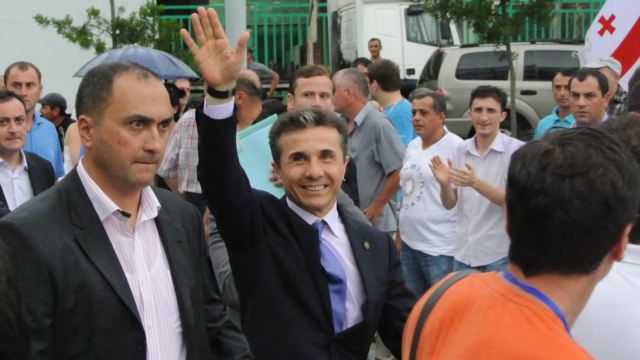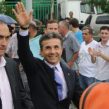
Georgia’s Parliamentary Elections: A Referendum on Reforms
Publication: Eurasia Daily Monitor Volume: 9 Issue: 158
By:

Echoing Ronald Reagan’s 1980 election campaign theme, Georgia’s governing United National Movement (UNM) tells voters to “ask [themselves] a very simple question: Is Georgia now a better country than it was eight years ago? And if the answer is positive and if we want to have a better country, we should all stand together – this is our offer.” UNM candidates and President Mikheil Saakashvili are casting the issue in those terms in the ongoing parliamentary election campaign. Similarly, Tbilisi mayor Gigi Ugulava (campaigning for UNM in the capital city) is asking voters to judge for themselves whether or not Tbilisi is a better city than it was eight years ago, when UNM took charge (Civil Georgia, August 16).
Reagan’s question was meant to elicit negative answers because he was challenging the incumbent’s poor track record. By contrast, the Georgian UNM is running on the strength of its own record of performance. The governing team is casting these elections as a referendum on that performance. By all quantitative measurements and international rankings of Georgia, the answers to UNM’s questions ought to be affirmative. Public opinion surveys show UNM well ahead of the opposition Georgian Dream in the run-up to the October 1 elections (see EDM, July 16).
On the other hand, opposition leaders have been hinting that the October 1 election returns would not necessarily settle the outcome. Instead, Georgian Dream leaders allude to post-election turmoil, in the event that they do not win the balloting. They seem to be preparing the ground for a post-election challenge by predicting a landslide in their favor, failing which they will cry foul and contest the outcome. That scenario draws a dividing line between the formal electoral process until October 1, and informal political processes to be triggered the day after.
According to the opposition’s billionaire leader, Bidzina Ivanishvili, Georgian Dream should receive three-fourths of the parliament’s seats in its best-case forecast, two thirds of the seats in its second-best forecast, and 40 percent of the seats in the worst-case. And “even this worst-case scenario would be devastating for them [the authorities],” he predicts (Civil Georgia, August 3). With this, Ivanishvili is climbing down somewhat from his previous month’s forecast, which predicted victories of “up to 90 percent” for Georgian Dream in most of Georgia’s regions (Civil Georgia, www.info9.ge, July 4, 6).
In early July, UNM had invited all political parties to negotiate and sign a code of conduct for these elections. UNM proposed a four-point draft, including a commitment by all parties to accept the electoral outcome, if this is validated by observers. A coalition of non-governmental organizations, named “This Affects You, Too” and usually critical of the authorities, offered a 17-point draft of its own. UNM accepted that and proposed drafting a common document to incorporate both drafts. Some opposition parties signed the joint document, but Ivanishvili’s party refused. It objected to the proposed commitment by all signatories “to recognize the election results, tabulated by the CEC and deemed legitimate by observer organizations with credible reputations.” Instead, Dream leaders want to handle “all the disputed issues about the election results solely through peaceful and constitutional ways” (Civil Georgia, August 1).
With that formulation, Georgian Dream leaders reserve the option to contest the elections’ results, if their own party does not win. This does not necessarily imply an attempt to topple the government. More likely, it implies using street protests to bargain with the government about some kind of division of power, in return for Georgian Dream’s recognition of the election results.
In the Georgian opposition’s own traditional language, “peaceful and constitutional ways” are elastic enough to cover marathon rallies, demonstrations on public thoroughfares and regime-change campaigns. These are not necessarily related to elections and come sometimes perilously close to the brink that separates civil disobedience from violence. Those tactics wreaked havoc on Tbilisi from 2007 to 2011, almost on a seasonal basis. In January and May 2008, the radical opposition refused to recognize the presidential and parliamentary elections’ outcomes, although Western observation missions validated them. Ivanishvili only entered politics in late 2011, but his coalition has scooped up the supporters of those small radical groups.
Radical oppositionists, together with many Ivanishvili supporters in the political mainstream, are drawn from sections of society that lost from Georgia’s successful reforms. In Tbilisi especially, tens of thousands (multiplied by family members) feel deeply aggrieved for lost employment in the former state bureaucracies, police, petty illegal trading, large corruption networks and organized crime. At the elite level, many of the old cultural nomenklatura and veteran political agitators deeply resent the Westernized young generation’s advancement in a modernizing Georgia.
The UNM’s questions, “is Georgia a better country than it was” or “are you better off than you were,” would be answered negatively by many in those social groups. Ivanishvili himself and most of his team look like a throwback to the 1990s in their formative experiences, track records and occupational backgrounds. Georgian Dream leaders seem to offer their voters an escapist illusion – that of stopping modernization processes in the country. Those resentments have been erupting regularly in Tbilisi in recent years; and, combined with Ivanishvili’s political purchasing power, they could well erupt again after election day. The Georgian Dream movement is a political expression of resistance to reforms and modernity.




